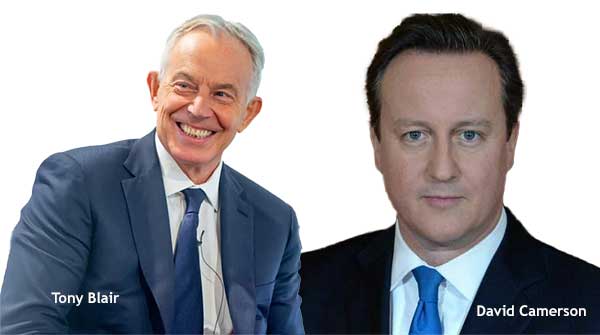Now that David Cameron is back, can the return of Tony Blair be far behind?
 There are times in life when everything comes full circle.
There are times in life when everything comes full circle.
If you need proof, look no further than two recent announcements. One former British Prime Minister has made an unexpected return to the rough-and-tumble world of politics, while another could be returning to the spotlight shortly.
Let’s begin with the stunning development.
British Prime Minister Rishi Sunak announced on Monday that David Cameron had been appointed to his cabinet as his foreign secretary. The latter had served as the nation’s PM from May 2010 to July 2016.
This decision was enough to leave you gobsmacked. In many instances, it probably did.
 |
| Related Stories |
| King Charles is a 21st century monarch for Canada
|
| Liz Truss’s stunning demise proves Brexit is not complete
|
| The final act of Boris Johnson’s political career
|
Cameron initiated the circus-like atmosphere that currently exists in his party. After holding power for five years in a coalition government with the Liberal Democrats, he won a majority government in May 2015. It was only by four seats, which isn’t the best scenario in which to govern. When the Labour Party foolishly elected the far-left Jeremy Corbyn as leader in September 2015, it was seen as a political gift that could give the Conservative PM an added lift.
Cameron’s biggest mistake turned out to be an election promise to hold a referendum on whether the UK should leave the European Union. He initially seemed to be in a good position to win this battle. The Brexit movement that opposed him and others grew with each passing day, and the Leave campaign ultimately won the June 2016 referendum with roughly 52 percent of the vote. He stepped down as PM in Oct. 2016.
A succession of Conservative Prime Ministers have served since that time.
Theresa May led from July 2016 to July 2019. She was an experienced politician who had served in several cabinet roles under Cameron. Her decision to hold a snap election in 2017 led to a minority government and coalition with Northern Ireland’s Democratic Union Party. May wasn’t a strong leader. She struggled to keep the Conservatives united domestically and internationally for most of her leadership. She ultimately lost her party’s confidence during her second term and resigned.
Boris Johnson led from July 2019 to September 2022. The longtime journalist had served as Mayor of London as well as in May’s cabinet. He led the government through Brexit, struggled with party unity during his first term – and still ended up winning the biggest Conservative majority since 1987. COVID-19 and the Partygate scandal ended up being his political undoing, and he resigned from office.
Liz Truss led from September to October 2022. Her weak leadership was a disaster from start to finish. A controversial mini-budget that proposed cutting income tax rates while temporarily increasing spending measures simultaneously was rejected by most economists and the financial markets. She stepped down after only 50 days as PM, the shortest tenure in British history.
Sunak has been PM for just over a year. While he has implemented some conservative policies, his technocratic leadership style has been off-putting to various MPs and cabinet ministers. He’s been tough on crime and terrorism but struggled to maintain caucus unity on social issues, foreign policy and the environment. His decision to bring Cameron, whom The Economist recently described as “one of the worst” British PMs, to his cabinet raises serious questions about his leadership.
Politics comes full circle, indeed.
The other development is the possible return of former British Labour PM Tony Blair.
According to media reports, Israeli Prime Minister Benjamin Netanyahu is considering Blair as a humanitarian co-ordinator for the Gaza Strip. The Ynet news outlet suggested that a significant part of this role would be “providing medical treatment and medicines, and on the possibility of evacuating the wounded and sick from the Strip.”
In fairness, Netanyahu hasn’t officially asked or nominated Blair. In turn, Blair has neither confirmed nor denied that he will take on such a role.
A spokeswoman for the former PM told the Financial Times, “As you know, Mr. Blair has an office in Israel and has continued to work on issues regarding Israel and the Palestinians. He is discussing the situation obviously with a number of people in the region and elsewhere to see what can be done. But there is no ‘role’ offered or taken.”
If his appointment ultimately happens, it would cause a huge tear on the left-right divide.
Many progressives have been disappointed with Blair for years since he supported the War on Terror and proposed overhauls of human rights legislation. They wouldn’t trust him to handle humanitarian affairs in Gaza. His possible involvement in the Israel-Hamas war wouldn’t greatly trouble the right-leaning Israeli PM and most Conservatives around the world, however.
Politics could experience another full circle moment before long.
It makes one wonder if life initiates art, or the art of politics is fooling life once more.
Michael Taube, a Troy Media syndicated columnist and Washington Times contributor, was a speechwriter for former Prime Minister Stephen Harper. He holds a master’s degree in comparative politics from the London School of Economics.
For interview requests, click here.
The opinions expressed by our columnists and contributors are theirs alone and do not inherently or expressly reflect the views of our publication.
© Troy Media
Troy Media is an editorial content provider to media outlets and its own hosted community news outlets across Canada.
